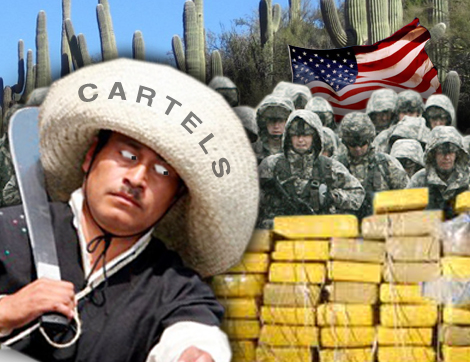
• CIA cooperation with drug cartels a dangerous threat to the future of the United States
By Keith Johnson
America’s war on drugs has been a catastrophic failure plagued with corruption scandals, unfulfilled promises and billions of taxpayer dollars wasted on a futile attempt to curb the flow of illegal narcotics into the United States. But could 2013 mark the beginning of a new era in which the United States military finally makes a sincere effort to address the clear and present danger emanating from just south of the border?
Probably not—but for what it’s worth—the Associated Press (AP) reports: “The Pentagon is stepping up aid for Mexico’s bloody drug war with a new U.S.-based special operations headquarters to teach Mexican security forces how to hunt drug cartels the same way special operations teams hunt al Qaeda, according to documents and interviews with multiple U.S. officials.”
The new training is reportedly set to take place at the U.S. Northern Command (USNORTHCOM) in Colorado Springs, Colorado, and will expand on an existing program that schools Mexican military, intelligence and law enforcement officials on U.S. counter-terrorism tactics.
Pursuant to an authorization by outgoing Defense Secretary Leon Panetta, the lieutenant colonel who currently oversees the operation will be replaced by a general, and the number of people assigned to the new headquarters is expected to grow from 30 to 150.
Anonymous U.S. officials who spoke with AP “stress that sharing this expertise does not mean U.S. special operations teams will be conducting raids against targets in Mexico,” since Mexican law forbids U.S. armed forces from operating inside their country.
Although this may sound like a move in the right direction, there are still plenty of reasons to remain skeptical.
It should be noted that USNORTHCOM’s training missions are made possible through the Mérida Initiative of 2008, a $1.6B military aid package that was introduced during the Bush administration, and part and parcel of the Security and Prosperity Partnership’s (SPPs) plan to merge the North American Free Trade Agreement (NAFTA) with a militarized tri-national homeland security force. Under this arrangement, Mexico was required to adopt and maintain an aggressive counter-narcotic, counter-terrorism and border security strategy that adheres to a strict military model.
The six-year military crackdown on Mexico’s drug traffickers is certainly a testament to this agenda. However, “The evidence of policy failure is undisputed: 47K Mexicans dead since President Felipe Calderón took office in December 2006; the continuing flow of hundreds of tons of cocaine and thousands of tons of marijuana into the United States despite post-9-11 border controls and anti-immigration fences; and more than $20B in drug cash and many thousands of U.S. guns streaming south into Mexico each year,” writes Fulton T. Armstrong, senior fellow at American University’s Center for Latin American and Latino Studies.
In December 2012, newly elected Mexican President Enrique Pena Nieto vowed to continue fighting all illegal drug production and trafficking in Mexico, but stressed that he will focus more on protecting ordinary citizens from gang violence rather than targeting drug cartel leaders.
This strategy could be seen by some as a departure from the accepted agenda and might explain why the U.S. is now offering advanced counter-terrorism training to their semi-reluctant ally. But even if Mexico’s new administration is persuaded to conform lockstep with U.S. objectives, will that really stem the tide of narcotics pouring into the U.S.?
During an August 2012 interview with this AMERICAN FREE PRESS reporter, former Drug Enforcement Administration agent Mike Levine stated, “The CIA and other intelligence agencies, right down to the Partnership for a Drug Free America, have a vested interest in maintaining a global drug problem. That’s what they live for. They pretty much rely on drug proceeds to fund their operations.”
History shows time and again that the U.S. is more concerned about “managing” the drug trade than actually fighting it and will often protect major drug traffickers who act as informants against less significant rivals. For example, in 2011, Vicente Zambada Niebla—a high-ranking member of the notorious Sinaloa drug cartel—claimed that federal agents granted him immunity and a virtual license to smuggle cocaine into the U.S. in exchange for intelligence on a comparatively minor cartel.
Until the U.S. cleans the corruption from its own ranks and strikes a decisive blow against Mexico’s major drug traffickers, winning the war on drugs will remain out of reach.
And it is a war worth winning. In the U.S. alone, illicit drug use kills nearly 20K Americans per year and “accounts for $181B in healthcare costs, productivity loss, crime, incarceration and drug enforcement,” according to the National Institute on Drug Abuse.
It’s time for the U.S. government to turn its powerful military might against America’s real enemies, rather than chasing down imaginary villains in the Middle East who pose no threat to our way of life.
Keith Johnson in an investigative journalist and host of the Revolt of the Plebs radio program.


